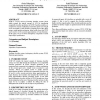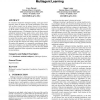605 search results - page 3 / 121 » Improving Generalization Performance in Co-Evolutionary Lear... |
BMCBI
2006
13 years 5 months ago
2006
Background: Recursive Feature Elimination is a common and well-studied method for reducing the number of attributes used for further analysis or development of prediction models. ...
IJSI
2008
13 years 5 months ago
2008
Many data mining applications have a large amount of data but labeling data is often difficult, expensive, or time consuming, as it requires human experts for annotation. Semi-supe...
GECCO
2006
Springer
13 years 9 months ago
2006
Springer
XCSF is a novel version of learning classifier systems (LCS) which extends the typical concept of LCS by introducing computable classifier prediction. In XCSF Classifier predictio...
NCA
2007
IEEE
13 years 4 months ago
2007
IEEE
: Autonomous neural network systems typically require fast learning and good generalization performance, and there is potentially a trade-off between the two. The use of evolutiona...
ATAL
2006
Springer
13 years 7 months ago
2006
Springer
In concurrent cooperative multiagent learning, each agent simultaneously learns to improve the overall performance of the team, with no direct control over the actions chosen by i...


